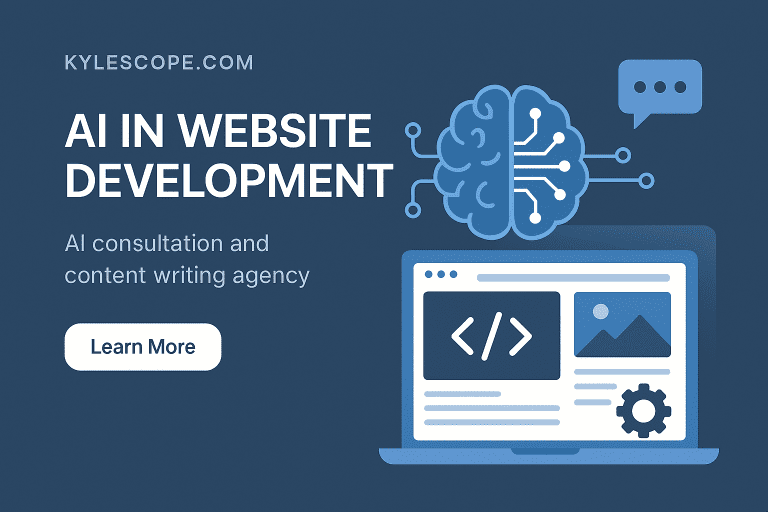
AI website development emanates from thorough research conducted over decades with the intention of empowering robots to replicate human cognitive abilities such as learning, decision-making, and solving problems. The term encompasses a wide array of technologies including machine learning, natural language processing, computer vision, and robotics. Such technologies empower computer systems to work on big data volumes, recognize intrinsic patterns, and make fact-based decisions.
As such, artificial intelligence is transforming website development procedures. AI is changing aspects of website development including website design, website development, and website maintenance. These technologies are revolutionizing repetitive operations including code generation, testing, and code deployment. Ultimately, AI is reducing the duration it takes to develop websites and is enhancing their efficiency. Moreover, the technologies are not only reducing development time but improving correctness, uniformity of website code, enhancing user experiences, conveying the means for personalized content, adaptive interfaces, and chatbots integration.
The advent of AI-powered analytics is changing the website development landscape through insights that analyze user behavior ultimately resulting in improved website performance, search-engine-optimization, and increased Click through Rates (CTR) and calls to action (CTA). Artificial intelligence is empowering website developers to create websites that are dynamic, focused on the users, and that may adjust based on specific user preference or inherent functionalities.
Techniques Used for AI Website Development
Artificial intelligence relies on a number of technologies for website development. This section of the article analyzes these technologies.
Natural Language Processing (NLP)
Natural language processing in the domain of website development entails the use of linguistic algorithms to enhance user engagement, create website content, and assess sentiments. NLP empowers website features such as chatbots to comprehend and respond to inputs based on human language. Such features enable improved customer support and personalized user experiences. The chatbots respond to user questions and optimize their responses on the basis of context and user history to improve user engagement.
Moreover, NLP enables website developers to create content including articles, product descriptions, and social media posts. Such tools generate content that is logical and fits different contexts. The type of content generated reverberates with target audience preferences or needs. Lastly, NLP conducts sentiment analysis to enable insight extraction from unstructured data including text files, video, surveys, and so many other sources. Therefore, website developers can extract insights from customer reviews, social media posts, surveys in efforts to find emotions, opinions, or even inherent attitudes.
AI Website Development of Recommendation Systems
Machine learning is a segment of artificial intelligence that performs predictive functions derived from user history or behavior to create individualized experiences. The recommendation system implements different forms of filtering including collaborative, content-based, and hybrid to suggest items, information, or services that correspond with user interests or behaviors. Such systems are prominent in ecommerce websites and may help website owners to drive sales as they derive insights from purchase history, browser history, and user habits of similar website users.
AI Website Development of Predictive Analytics
Website predictive analytics, just like AI analytics and insights, relies on machine learning to establish future patterns and behaviors. As such, artificial intelligence is helping website developers and users to predict user requirements, dispense content, and make decisions. Some of the specific ways that artificial intelligence is contributing to website analytics include user attrition prediction which helps businesses determine the best methods of user retention, website traffic determination to help with optimizing server resources, audience segmentation for marketing purposes, and target campaigns establishment through captured customer responses and conversion probabilities.
AI Website Development of User Behavior Automation
Machine learning contributes to user behavior automation as it enables website developers to perform interactions and engagement patterns. This form of automation enables the acquisition of website navigation patterns, specific feature interactions, and assessing satisfaction levels. Such technologies empower the acquisition of information such as click-through rates, session duration, browsing paths to establish user preferences and satisfaction. Ultimately, website developers can optimize website designs. Other features conveyed include heat maps and journey assessments to optimize user experience.
Computer Vision
This is a segment of artificial intelligence that solves business problems through the acquisition and conversion of visual data from images, videos, and other media inputs. Computer vision algorithms can perform tasks such as object detection, image categorization, and scene recognition. For example, image recognition, which is a component of computer vision, enables image categorization and the accessibility of information pertinent to the image just like in Google Images.
Visual Content Analysis
This refers to the integration of computer vision to scrutinize and understand visual data such as images and films. These algorithms can perform numerous tasks including object detection, object categorization, and scene recognition based on photos or videos. Such features enhance information search-ability and user engagement.
AI Automation in Website Development
Artificial intelligence is also contributing to AI automation within websites. This takes place under the domains of code generation, testing and debugging code, and code deployment and maintenance. The section below elaborates each of these domains.
Code Generation for Website Development
Artificial intelligence is revolutionizing code generation for website development. These code generation tools utilize machine learning to create code. An example of such a platform is the Github Copilot, which analyze the code environment and convey code snippets. These technologies optimize code development by providing ideas and automating repetitive coding processes.
Code Testing and Debugging
Artificial intelligence enables numerous features for code testing and debugging such as end-to-end tests. These technologies can imitate user interactions, recognize irregularities, and detect problems in comparison to manual code testing methods.
Deployment and Maintenance
This refers to the use of continuous integration/continuous deployment pipelines to organize code deployment and maintenance hence achieving smooth deployment, downtime reduction, and enhance stability. AI manages deployment processes such as code integration, testing, and feature releases through real-time monitoring. Moreover, they can predict potential problems that may affect code deployment and give insights that may stop hazards from affecting users or stakeholders.
AI Website Development Consultation
The advent of artificial intelligence is seeing few proficient experts in AI Website development. It is safe to consult experts who have an educational background along with industry experience for help with building websites. Such experts will recommend the best AI website development tools and can even help you develop websites that meet your requirements or help with making repairs.
Are you looking for help with AI Website Development?
We can help you. Share your details below and we shall get back to you promptly.
